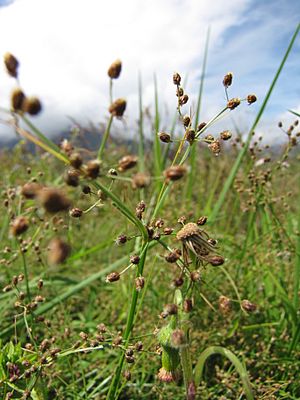Lesser fimbry facts for kids
Quick facts for kids Lesser Fimbry |
|
|---|---|
 |
|
| Scientific classification | |
| Genus: |
Fimbristylis
|
| Species: |
littoralis
|
Fimbristylis littoralis, often called lesser fimbry or lesser fimbristylis, is a type of plant known as a sedge. Sedges are plants that look a lot like grasses but are actually different. This plant is part of the Cyperaceae family. It grows naturally in many countries in Africa, Asia, and Oceania, including a large part of northern Australia.
Contents
What the Plant Looks Like
The Lesser Fimbry is a plant that lives for about a year. It grows in clumps and can reach a height of about 5 centimeters (2 inches) to 70 centimeters (2.3 feet). In Australia, its green-brown flowers appear between February and August.
Stems and Leaves
The plant has thin stems, called culms, which are usually 40 to 60 centimeters (16 to 24 inches) long. These stems often have four or five flat sides. Its leaves can grow up to 40 centimeters (16 inches) long and are about 1.5 to 2.5 millimeters (0.06 to 0.1 inches) wide. The leaves at the bottom are stiff and thin, usually about half the length of the stems.
Flowers and Seeds
The flowers grow in a spread-out cluster called an inflorescence, which looks like a loose umbrella shape. This cluster is typically 6 to 10 centimeters (2.4 to 4 inches) long. Inside the cluster are small, reddish-brown, oval-shaped flower parts called spikelets. Each spikelet is about 2.5 to 4 millimeters (0.1 to 0.16 inches) long and 1.5 to 2 millimeters (0.06 to 0.08 inches) wide. They are either round or pointed at the top. The plant also has small, protective leaf-like parts called glumes, which are about 1 millimeter (0.04 inches) long and arranged in a spiral. It has yellow anthers, which are the parts that produce pollen.
How it Was Named
The Lesser Fimbry was first officially described by a botanist named Charles Gaudichaud-Beaupré in 1829. He wrote about it in a book called Voyage Autour du Monde ... sur les Corvettes de S.M. l'Uranie et la Physicienne, which was part of his work on botany.
Where the Plant Grows
In Australia, you can find the Lesser Fimbry in Western Australia, especially in the Kimberley region. It likes to grow in swamps, along creeks and rivers, and other wet places. It often grows in sandy-clay soil, especially around areas with basalt rock. It is also found across the Top End of the Northern Territory and in the tropical parts of Queensland.
Introduced to Other Places
This plant has also been brought to North and South America, where it is now considered a weed. It is believed to have arrived in the Caribbean islands in the late 1800s, possibly as a tiny seed mixed in with other plants. It was first collected in Puerto Rico in 1886.
Problem in Farms
The Lesser Fimbry can be a problem plant in rice fields in warm, tropical, and subtropical areas around the world. It also grows in banana and maize (corn) farms in Taiwan, abaca (a type of banana plant) farms in the Philippines, taro (a root vegetable) farms in Hawaii, and sugarcane and maize farms in Indonesia.

